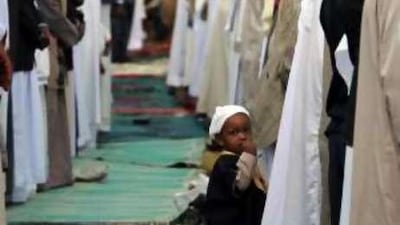NAIROBI // A Kenyan high court has ruled that a separate legal system for the country's Muslim minority is illegal, jeopardising a new constitution that government officials hope to pass through an August referendum.
Since Kenyan independence in 1963, Kadhi courts, based on Sharia, have been permitted in predominantly Muslim areas of the country. Before that, the Islamic courts were allowed through treaties with British colonisers. The courts rule only on questions of Islamic law in cases relating to marriage, divorce and inheritance involving Muslims who submit themselves to the court. Kenyan law still applies to Muslims, and the Kadhi courts are not intended as an alternative to the Kenyan justice system.
Christian groups filed a lawsuit against the Islamic courts six years ago, claiming that the Kadhi courts favoured Islam over other faiths and were unconstitutional because Kenya is a secular country. A three-judge panel agreed last week, but the judges said parliament must vote to outlaw the courts. The timing of the ruling could not be worse for government leaders who are trying to pass a new constitution. The Kadhi courts, as well as a provision on abortion, are the two most contentious issues of the proposed constitution. Government officials dismissed the ruling and vowed to appeal.
"I totally condemn" the ruling, Mutula Kilonzo, the justice minister, told the local Star newspaper. "Its thinking and spirit is very archaic and lends false sense of security to Christians. It splits the country into two and splits the Muslims into two as well." Church leaders have campaigned to defeat the constitution at a referendum because of those two issues. Amos Wako, the attorney general, said the August 4 referendum will still proceed.
"The court lacked jurisdiction, and the judgment is wrong in law and created a bad precedent," Mr Wako said in a statement. The ruling has angered Muslims, who make up 10 per cent of the population and live mostly along the coast in the eastern frontier near Somalia. "It is due to a colonial agreement that we have the Kadhi courts in the current constitution," Hussein Sasura, a member of parliament, told reporters. "It is not there because one religion is favoured. The Kadhi courts will be retained ultimately whether one likes it or not."
The Supreme Council of Kenyan Muslims, an umbrella body of all Muslim organisations in Kenya, denounced the ruling at a press conference at a mosque in downtown Nairobi. The ruling "was made in bad faith and is calculated to sow seeds of discord", said Abdulghafur el Busaidy, the chairman of the Supreme Council of Kenya Muslims. The judges "cannot declare illegal any provision of the constitution, whether it pertains to the Kadhi courts or otherwise".
Some accused the high court of trying to sabotage the draft constitution because it would reform the judiciary. An MP asked parliament to investigate whether the judges' ruling was politically motivated. "The judiciary is an aggrieved, interested party which is against the constitution because they will be subjected to vetting or resignation for those who do not comply," said Najib Balala, a member of parliament. "But we know the constitution will transform the judiciary so that Kenya can get justice and move forward."
The move against Islamic courts is the latest clash in the culture war that has divided Kenyans over the new constitution. Last month, Christian leaders launched a campaign to scuttle the constitution because of a clause they say could legalise abortions. Abortion is currently allowed only for medical reasons, and the new constitution would continue that exception. Church leaders hold tremendous sway in this predominantly Christian country. They have been holding talks with government officials to work out their differences in the draft charter.
Drafting a new constitution is part of a painfully slow process of reform after Kenya's post-election violence in early 2008. Clashes between rival tribes after the flawed presidential poll killed more than 1,300. The new constitution would add measures to prevent future political violence. It would limit the president's powers, reform the judiciary and change the way Kenyans are represented in government. Western governments, including the United States, are backing the new constitution.
Supporters of the draft constitution accuse opponents of trying to derail the referendum. But the ruling against the Kadhi courts should not stand in the way of the vote in two months, the Daily Nation newspaper said in an editorial. "It is gratifying that the constitutional court ruling declaring the Kadhi courts illegal does not place a legal barrier to the continuation of the review process and the August 4 referendum," the newspaper said. "The important thing right now is that the constitution reform process proceeds to its logical conclusion: the referendum."
mbrown@thenational.ae

